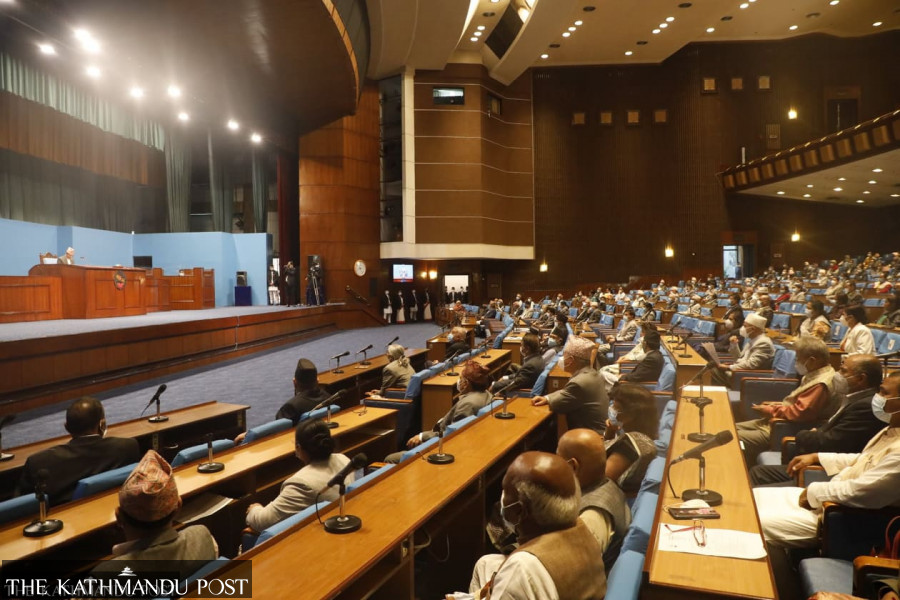Politics
Parties using deputy Speaker’s position as a bargaining chip is wrong, observers say
The ruling alliance has agreed to give the long vacant deputy Speaker’s post to the Janata Samajbadi Party as part of a power-sharing deal.
Binod Ghimire
Over three months after forming the government, the ruling alliance is preparing to elect a deputy Speaker in the House of Representatives which is vacant for nearly two years.
The five-party alliance agreed to allocate deputy Speaker’s position to Janata Samajbadi Party during a power-sharing deal forged two weeks back before the Cabinet expansion on October 8. In the 25-member Cabinet, Nepali Congress got nine ministers and a minister of state. But one of the ministers, Gajendra Hamal, resigned after two days following the controversy that he was appointed at the behest of Chief Justice Cholendra Shumsher Rana.
CPN (Maoist Centre) has five ministers and a minister of state while CPN (Unified Socialist) has four ministers and a minister of state.
Janata Samajbadi Party, another ruling partner in the Sher Bahadur Deuba government, got four ministers in the power-sharing deal. And in exchange for the post of minister of state there was an agreement among the parties to allocate deputy Speaker’s position to the Janata Samajbadi Party.
“The Janata Samajbadi Party has a claim over the position and the party will most probably have it,” Ramesh Lekhak, a Nepali Congress leader, told the Post. “The House will get the position soon.”
Despite being a crucial position of one of three state organs, the deputy Speaker’s position is vacant since Shiva Maya Tumbahangphe resigned the post on January 20, 2020. She had to resign after then Nepal Communist Party (NCP) decided to field Agni Sapkota as Speaker’s candidate after Krishna Bahadur Mahara resigned following a charge of attempted rape.
Tumbahangphe’s resignation was a must for Sapkota to become Speaker as the Constitution of Nepal doesn’t allow Speaker and deputy Speaker from the same party.
Article 91 of the constitution makes it mandatory to elect Speaker and deputy Speaker within 15 days of the first meeting of the House of Representatives. The constitution, however, doesn’t set any deadline for their elections if the positions fall vacant partway through the parliament’s term.
Experts on parliamentary affairs say it was wrong to keep the deputy Speaker’s position vacant for more than one-third of the parliament’s full term. They say while it is good that the ruling parties are working to fill the deputy Speaker’s position, the way it was used as a bargaining chip in the power-sharing deal is wrong.
“The parties didn’t feel it necessary to fill the position until it was included in the power sharing-deal,” Daman Nath Dhungana, a former Speaker and a civil society leader, told the Post. “A lawmaker from a political party gets the position, but the way parties are sharing the position is wrong.”
Speaker and deputy Speaker are neutral posts. Individuals assuming these positions have to resign from their parties once they get elected. As the presiding officers of the House, they must be fair and just irrespective of their political affiliation.
But when these positions are doled out as part of a power-sharing agreement, experts say the individuals who assume the role of Speaker or deputy Speaker cannot be held in high moral esteem as envisioned by the constitution.
“This also shows that our political parties do not respect these positions,” Tara Nath Ranabhat, a former Speaker, told the Post.
Deputy Speaker, whose role is to lead the House in the Speaker’s absence, is also a member of the Constitutional Council. The council is headed by the prime minister with the chief justice, House Speaker, National Assembly chair, deputy Speaker, and the main opposition leader as members.
The then prime minister KP Sharma Oli of the CPN-UML introduced ordinances to revise the Constitutional Council (Functions, Duties, Powers and Procedures) Act, 2010 twice, allowing the council to convene its meeting in the presence of a majority members of the council. Before the amendment, the Act required that five of the six members of the council must be present at its meetings.
After revising the Act, Oli convened the council meetings on December 15 last year and May 4 in the presence of just the chief justice and the National Assembly chair and made 58 recommendations for the posts of chairpersons and members in 12 constitutional commissions. As many as 52 of them took the appointments.
Ranabhat said had the deputy Speaker’s position not been vacant, Oli wouldn’t have been able to take such a step.
Constitutional experts say the political sharing of the deputy Speaker’s position shows that parties have no respect for political and constitutional principles.
“Our parties have set their political principles so low that we cannot expect principled decisions from them,” advocate Mohan Lal Acharya, who specialises on constitutional law, told the Post.




 13.12°C Kathmandu
13.12°C Kathmandu














